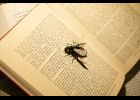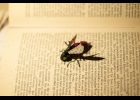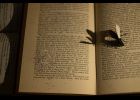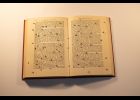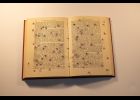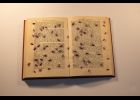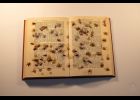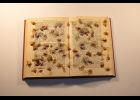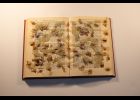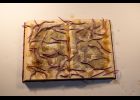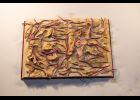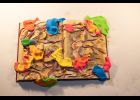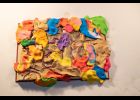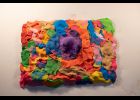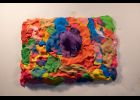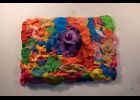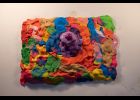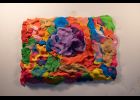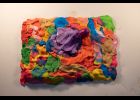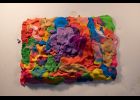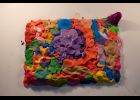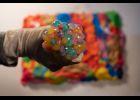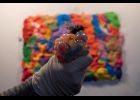Bibliophagus convictus – Relatório 313 sobre o incidente “Caso Alegria” / Bibliophagus convictus – Report 313 on the “Alegria Case” Incident
This fictional work composed of both text and images is based on the short text “Thirteenth Scenario: Chemical Industry” from the series of philosophical fictions What If? (Flusser 2022: 47-49). In his text, Vilém Flusser creates a fantastic insect that feeds on texts, the Bibliophagus convictus. Honoring the fictional endeavor of this philosopher, we seek to expand the original scenario, respecting certain data provided by the author and filling in some gaps left open. In the illustrated part, we present a series of photographs made from three-dimensional representations of the insect in its habitat. These illustrate its reproductive cycle, with the different stages of development of the organism. The literary component aims to reproduce a fictitious official and institutional communication between intelligence services in an autocratic, futuristic society with fascist characteristics.
A metamorfose de Kafka em Flusser
The most famous literary metamorphosis is Kafka’s short eponymous tale published in 1915. For more than a hundred years now, the first sentence of The Metamorphosis has been provoking an infinite series of metamorphoses: in culture, literature, as well as in readers and writers. Among the writers most affected by the event, we find Vilém Flusser who turned himself into Brazilian and foreigner in the world at the same time. Flusser transformed philosophy into a philosophical fiction and charged it with the same sardonic irony we associate with Kafka’s fiction. Because of his metamorphoses, he became a fictional character himself, as Rainer Guldin and I pointed out in the biography we wrote about him. Sérgio Paulo Rouanet called Vilém Flusser ironically a Meta-Švejk. Flusser did not consider himself a post-philosopher – a Post-Husserl or Post-Vaihinger – but rather a Post-Kafka. In this sense, his philosophy is a kind of a post-Kafkaesque fiction.
How to Face the Terror of Reason: From Philosophy to Literature
This paper explores the relationship of philosophy and literature, and the role of irony in the search of a possible way out of the hell of the apparatus created by the terror of reason. Franz Kafka’s Gregor Samsa from The Metamorphosis and Jaroslav Hašek’s Švejk from The Adventures of Brave Soldier Švejk pre-figure the future and are in a way are ironical brothers of Vilém Flusser.
Drafting the Techno-Imagination: A Future for Literary Writing?
Vilém Flusser paints a dire picture for the future of literary writing. He contests that it is doomed to be replaced by automated language games. In that sense, one can see literature and the image-culture as antagonistic forces. Drawing on examples from contemporary German literature, however, I show in which ways the literary imagination may contribute to the formation of the techno-imagination. The authors Ulrike Draesner and Thomas Lehr scrutinize the impact that visual media has on conceptual thinking and identity. Core ideas from Flusser’s media theory, such as the photographer as homo ludens, communication as resistance to natural entropy, and the re-conceptualization of space and time, feature prominently in the two 2005 novels Spiele (Games) and 42. In these texts, the imaginative capacity of fictional literature provides a conceptual space in which a new awareness towards technical images is drafted, tested, and reviewed.
“O Ser que nega”
The article develops the Flusserian metaphor of the mirror as a being who denies, by relating it to the short stories of Machado de Assis and Guimarães Rosa, which have “The Mirror” as their title. The mirror of these three writers, just as their fiction or their philosophical fiction, denies reality to propose an alternative reality. The article also shows how the thinking of Vilém Flusser is connected with the fiction of God built by civilization, with the God of fiction as He appears in literature.
Rhapsody in Blue. Vilém Flusser und der Vampyroteuthis Infernalis
The depths of the sea, their obscure inhabitants and their mysteries have always been a rich source of myths and metaphors for authors and philosophers. Fables about giant squ ids and monstrous octopuses run through the history of literature and culture. The vampire squid is only a small phylogenetic relic, but it provides a useful model for Flusser's hybrid philosophical fiction Vampyroteuthis Infernalis. Flusser slips metaphor ically into the creature’s gelatinous skin in order to speculate on the paradigms of postmodern life, measuring the abyss from the inside and producing a very peculiar, experimental form of thinking and writing. In the present era of virtual reality and co mputer simulations, we experience fiction as the only reality. According to Vaihinger's definition, fiction is a useful construct that is precisely not real, but enables human beings to create and manipulate their environments. His philosophy of “ as if ” is perhaps the fullest expression of fictionalism and shows its ambivalent potential.






